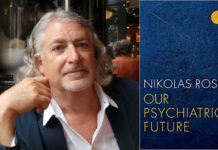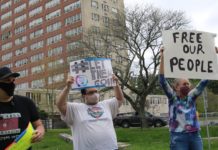Diving into Your Soul: Lessons from “Queer Eye”
"Queer Eye" has a fresh, therapeutic twist: Installment after installment, it sends the repeated messages: Take care of yourself. Be kind to yourself. You’re beautiful. You’re good. We love you. Love yourself. Or, in the words of Van Ness: Yass, queen!
Leading Psychology in Existential Times: An Interview with Kirk Schneider
MIA’s Justin Karter interviews humanistic-existential psychologist Kirk Schneider about how psychology can play a role in confronting the political, social, and climate crises facing humankind.
“I Found My Lion’s Roar”: Ro Speight on Combining Peer Support and Open Dialogue
MIA's Ana Florence interviews recovery advocate Ro Speight about her journey from receiving Peer Support to working as a facilitator in Peer Partnered Open Dialogue.
Will the Mental Health Industry Undermine the Community-Based Climate Change Revolution?
As mainstream mental health ideas and approaches are increasingly incorporated by community resilience-building groups, critics warn about the dangers of pathologizing and medicalizing reactions to climate change.
An FDA Whistleblower’s Documents: Commerce, Corruption, and Death
In 2008, a reviewer of psychiatric drugs at the FDA, Ron Kavanagh, complained to Congress that the FDA was approving a new antipsychotic that was ineffective and yet had adverse effects that increased the risk of death. Twelve years later, a review of the whistleblower documents reveal an FDA approval process that can lead to the marketing of drugs sure to harm public health.
Psychiatry and the Selves We Might Become: An Interview with Sociologist Nikolas Rose
MIA’s Ayurdhi Dhar interviews the well-known sociologist of medicine, Nikolas Rose, about the role psychiatry plays in shaping how we manage ourselves and our world.
How to Know What We Don’t Know: An Interview with Psychologist and Novelist Jussi...
MIA's Gavin Crowell-Williamson interviews the neuropsychologist and novelist Jussi Valtonen about how novels can lead us to see the limits of our understanding.
Mental Health and Emotion in the Digital Age: An Interview with Ian Tucker
MIA's Tim Beck interviews psychologist Ian Tucker about the relationships between digital technologies, emotion, and mental health.
Reporting the COVID Crisis at Psychiatric Hospitals: A Missed Opportunity
In its coverage of the impact of COVID on psychiatric hospitals, the media missed opportunities to challenge stereotypes and interrogate problems with current carceral approaches to mental health treatment.
World Benzodiazepine Awareness Day 2020
This week on MIA Radio, we present the second part of our podcast to join in the events for World Benzodiazepine Awareness Day 2020...
Bridging Critical and Conceptual Psychiatry: An Interview with Awais Aftab
MIA’s Justin Karter interviews psychiatrist Awais Aftab about how “conceptual competence” uses philosophy to transform psychiatry.
Exercise for Youth Mental Health in the Lockdown: Interview with Psychologist Scott Greenspan
School Psychologist Scott Greenspan discusses how to promote exercise and mental wellbeing for adolescents stuck indoors during the pandemic.
Bringing Human Rights to Mental Health Care: An Interview with UN Envoy Dainius Pūras
MIA's Ana Florence interviews United Nations Special Rapporteur Dainius Pūras about his own journey as a psychiatrist and the future of rights-based approaches to mental health.
“Free Our People!” Ex-Psychiatric Patients Demand COVID-19 Accountability in State-Run Facilities
Residents and workers are dying from COVID-19 exposure in Massachusetts state hospitals. One group of ex-psychiatric patients and allies has had enough.
When Psychology Speaks for You, Without You: Sunil Bhatia on Decolonizing Psychology
MIA’s Ayurdhi Dhar interviews Sunil Bhatia about decolonizing psychology, confronting the field’s racist past, colonial foundations, and neoliberal present.
Bedlam: Public Media, Power, and the Fight for Narrative Justice
A new mental health documentary awakens longstanding tensions around voice, representation, and the power to define problems and solutions.
Do Antipsychotics Protect Against Early Death? A Review of the Evidence
Psychiatry is now claiming that research has shown that antipsychotics reduce mortality among the seriously mentally ill. A critical review of the literature reveals that this claim is best described as the the field's latest "delusion" about the merits of these drugs.
Muzzled by Psychiatry in a Time of Crisis
The American Psychiatric Association and its former president, Jeffrey Lieberman, have used the Goldwater Rule to try to silence Yale psychiatrist Bandy Lee and colleagues who warned, in a collection of essays, about why President Trump is "dangerous." Why would a guild choose to do this?
Life Inside America’s Psychiatric Facilities During the Pandemic: Eyewitness Accounts
Insiders paint a picture of chaos and fear in public and private psychiatric hospitals across the country. "Now that she has been discharged, Sevigny is getting the truth out, just as the nurse asked her to do. She also plans to continue to organizing in her state, with and on behalf of those who continue to be subjected to dangerous conditions in the name of care."
America’s Psychiatric Facilities Are ‘Incubators’ for COVID-19
As the novel coronavirus continues to wreak havoc around the globe, whistleblowers at American psychiatric facilities paint a picture of mismanaged COVID-19 responses and lax safety protocols, putting patients, workers, and the surrounding communities in harm’s way. Some even allege coverups of deaths.
Where Western Medicine Meets Indigenous Healing: An Interview with Anthropologist Ian Puppe
MIA's Micah Ingle interviews the anthropologist Ian Puppe on how the imposition of psychiatric treatments can lead to harmful iatrogenic effects with Indigenous peoples.
Narrating Asylum History Through an Anti-Racist Lens: An Interview with Author Mab Segrest
Mab segrest is Professor Emeritus of Gender and Women's Studies at Connecticut College and the author of Administrations of Lunacy: Racism and the Haunting...
Inside a Pandemic: Media Struggle to Define What’s Normal
Press coverage of the effect of COVID-19 on mental health sends a confusing message: Becoming anxious about it is normal if you are mentally healthy but a sign of illness if you’re not. Although apparently some "normal" people might experience so much anxiety that they, too, could now be seen as mentally ill.
“Not Fragile”: Survivor-Led Mutual Aid Projects Flourish in a Time of Crisis
During the current pandemic, the practice of mutual aid—defined broadly as the ways that people join together to meet one another’s needs for survival and relationship—has become mainstream. Yet, often missing from major media coverage of mutual aid is any acknowledgment of its roots in movements led by marginalized people, including Black and Brown people, disabled people, mad people, and psychiatric survivors.
Mutual Support in an Age of Social Distancing
Connection, whether one-on-one or in groups, is at the heart of peer support. In a time when social distancing and stay-at-home orders proliferate, the Western Massachusetts Recovery Learning Community/Wildflower Alliance (WMRLC) is finding creative ways to adapt to rapidly changing circumstances dictated by the novel coronavirus.

































